Buy One Get One FREE on Everything. Use Code BOGO1
![]()
![]()


Anxiety and Depression Association of America claims that anxiety disorders affect about 18% of the U.S. adult population. It means that as many as 40 million adults suffer from anxiety in the U.S. alone making it the most common mental illness in the country. And what is the right CBD oil dosage for anxiety.
Though anxiety can be treated easily, only 36.9% of its patients receive treatment for it. Many people who suffer from anxiety disorders also suffer from depression.
Anxiety can cause:


One may suffer from anxiety disorders at any stage of life. But it usually begins in middle age. According to ADAA, a woman is twice more likely to develop an anxiety disorder than a man – from the time she achieves her puberty until she turns 50.
The female brain does not process serotonin as quickly as the male brain. Serotonin is the ‘happy’ hormone that helps us regulate our moods.
Women are also more sensitive to low levels of CRF (corticotropin-releasing factor). CRF is the hormone that allows mammals to organize their response to stress.
National Institute of Mental Health (NIMH) mentions some other risk factors for all types of anxiety disorders. These include:


CBD or cannabidiol is one of the many cannabinoids found in cannabis. Its famous cousin THC (delta-9-tetrahydrocannabinol) is known for producing a ‘high’ when one smokes or eats weed. CBD, on the other hand, is non-psychoactive and does not cause intoxication.
Cannabis plants with more than 0.3% THC are considered ‘marijuana’ which is a controlled substance in the United States. The truth is that marijuana plant extracts may contain up to 30% THC. Marijuana or THC-containing oils and products are illegal in many states.
CBD is completely safe. World Health Organization (WHO) states in its report on ‘Cannabidiol’ mentions that CBD has ‘not associated with abuse potential’. The popularity of CBD oils has seen a sharp spike in the last five years. Companies claim that it treats everything – from pain and inflammation to anxiety and stress to cancer and side-effects of cancer treatments.
CBD is also found in the industrial hemp plant. Hemp plants are the varieties of cannabis plants which contain less than 0.3% THC. The 2018 Farm Bill protects industrial hemp and all the products derived from it across the U.S. Everyone interprets it differently. Many people think that the legal protection extends itself to CBD hemp oils as they are extracted from ‘hemp’ plants.
State regulators are still not clear about the legality of CBD possession, use, sale, and purchase in many cases. Many low-quality CBD oils have THC component which makes them illegal. CBD companies often resort to mislabeling the products or making false claims in their marketing gimmicks. FDA has issued warning to many companies for making claims that are not supported by scientific evidence yet.
Many cannabis oil (or CBD oil) users claim that it has helped them in myriad ways. They claim that using CBD oil has helped them with:
Legalization of marijuana in many US states is also changing the CBD scene. 33 states have now legalized cannabis for medical purposes, including 11 states who allow the use of cannabis for recreational purposes. This has made CBD oils more accessible for people who want to use it for stress and anxiety.


A study was published in June 2019 in a journal called Pharmacology Biochemistry and Behavior. It studied the effects of CBD (cannabidiol) in Fmr1 KO and WT mice.
Fmr1 KO stands for Fmr1 gene knockout. It is a process by which scientists prepare mice models of Fragile X mental retardation 1 (Fmr 1) symptoms. WT stands for wild type mice.
The study found that CBD treatment decreased the anxiety-like behavior of all mice. The CBD dosage for anxiety that produced positive effects in this study was 5 mg per kg of bodyweight of the mice.
CBD has a calming effect on the central nervous system. Recently, Shannon’s study was published in The Permanente Journal. It explored the effects of CBD treatment on 72 adult anxiety patients. It was seen that the anxiety scores of 57 patients decreased within the first month. Rest of the patients too exhibited considerable improvement in their anxiety scores during the study duration.
Most of the anxiety patients in the study were given a dose of one 25 mg CBD capsule per day after breakfast. Some patients were given a dose of 50 mg or 75 mg of CBD per day in the capsule form depending on their conditions. The CBD dosage for anxiety of one patient with a history of trauma as well as the schizoaffective disorder was gradually increased to 175 mg per day.
In some other studies, cannabidiol failed to produce anxiolytic or anti-depressant effects. Scientists recommend more controlled studies to confirm the effects of the use of CBD on anxiety patients. Clinical trials to determine CBD dose for humans and different kinds of pets are also needed.


CBD is a cannabinoid that interacts with the cannabinoid receptors in the body. These cannabinoid receptors are part of the endocannabinoid system (ECS) in the body. ECS is responsible for maintaining the balance of a lot of things in the body, including:
CBD affects the CB1 receptors that affect the serotonin levels in the body. Serotonin acts as a neurotransmitter that regulates mood disorders. Hence, CBD oil can help with mental conditions like anxiety, stress, and depression.
A 2013 study found that repeated administration of CBD on chronically stressed mice triggered hippocampal neurogenesis. It means that cannabidiol regenerated the neurons in the hippocampus of the mice. Hippocampus is the part of the brain which is responsible for cognition and memory. People who suffer from anxiety and depression tend to have a smaller hippocampus which warps their thinking patterns. In this study, the mice were subjected to chronic unpredictable stress daily. After each stressor, they were administered 30 mg of CBD per kg of mice’s bodyweight.
Psychiatric drugs, designed for anxiety or depression, contain SSRIs (selective serotonin reuptake inhibitors). Cannabidiol works like SSRIs. It brings serotonin levels back to normal. Hence, CBD supplements can help in reducing the anxiety symptoms considerably.


Cannabidiol dosage differs from person-to-person. The right dose of the CBD oil also depends on its:
The Food and Drug Administration (FDA) has not issued a recommended daily dosage of CBD oil yet. Hence, it is up to the user to calculate the appropriate CBD dose based on what companies and doctors recommend.
To determine the right CBD dose for you, you first need to know how much CBD is there in the product you buy. Most companies mention the total amount of CBD in a bottle or a package. One has to divide it by the number of grams or milliliters of the bottle to know the amount of CBD in 1 mg CBD edible or 1 ml drop of CBD oil or tincture.
Some products mention the amount of CBD per serving size of the product. In this case, you can calculate the amount of CBD in milligrams depending on the serving size of the product. For example, if 10 drops of CBD oil contain 25 mg of CBD, one drop will contain (25/10=) 2.5 mg of CBD.
CBD doses may vary according to your:
The standard CBD dose recommendation is 1 to 6 mg per 10 pounds of bodyweight. It means that is someone weights 100 lbs, the starting dose should be around 10-20 mg of CBD. The upper limit of the CBD dose such a person can take hovers around 50-60 mg.
People with chronic pain often need higher those that people who suffer from situational anxiety.
To determine the right dosage for you, start small. Take the least amount of CBD oil dosage for your body weight. Give your body 3 days to assimilate it properly. Depending on the effects you see, you can increase or decrease CBD doses until you reach the desired results.
It is crucial to record your progress while you are adjusting the dose of CBD oil you are taking. If you lose weight, you might want to decrease your CBD dosage during the next 3-day duration. Loss of weight may happen due to a decrease in:
Similarly, if you gain weight due to:
you may need to increase the amount of CBD oil you are taking.
CBD may sometimes make you feel tired. If that happens, you might have to re-adjust when you take your CBD dose. People who want to sleep better might want to take a single dose at night. Those who want to get rid of anxiety at work and still want to stay alert may split the dose twice a day.
Regular use of THC reduces the number of cannabinoid receptors in the body. CBD users develop a tolerance for it and people have to increase the marijuana dose over time to achieve the desired effects. Surprisingly, CBD may exhibit reverse tolerance over time. It is opposite of what we see in THC. Reverse tolerance means that the regular use of CBD increases natural endocannabinoids in the body. Hence, over time, patients can decrease the CBD dose to achieve the same results.
In one study, it was found that about 32.6% of epileptic patients developed a tolerance for a high-CBD product after seven months. No such study was available to show if anxiety patients develop CBD tolerance or not over long-term use.
CBD tolerance is stubborn. It may take weeks, months, or years to change. If you have been using CBD oil for several months or years and are no longer achieving the desired results, you may be developing a tolerance for it.
In this case, you may:
CBD’s elimination half-life in humans is 18-32 hours. Hence, you can give your body a break by not taking CBD for 48 hours. It will allow all the CBD to get out of your body and ‘reset’ your ECS. If you are taking CBD oils with THC, you may also have to keep a check on your THC tolerance level too.
Inhalation of CBD oil or vape CBD oils takes only 1 to 3 minutes of showing their effects. Its effects last for two to three hours. CBD oil tinctures that are taken sublingually come a close second. When you put CBD oil drops under the tongue, they take 5 to 20 minutes to start showing their effects. Sublingual CBD tinctures’ effects last for 4 to 6 hours.
Anxiety patients must remember that if they are vaping CBD or taking CBD oil sublingually, they should start with a very small dose. They may take a higher dose of CBD edibles, food additives, or capsules.
Oral CBD products take 30 to 90 minutes to show their effects and they last for more than 4 hours.
CBD lotions, balms or transdermal patches may be used to counter pain but they are not much effective for anxiety patients.


CBD oil is a safe product in general. But it does have some side-effects, such as:
If you experience any of these side effects, you must consult your doctor. People who are on anxiety medication might also want to discuss CBD oil use with their psychiatrist first.
![]()
![]()
![]()
![]()
![]()
![]()
We The People Hemp was founded in 2018 to bring quality CBD products and information to the global marketplace.
![]()
![]()